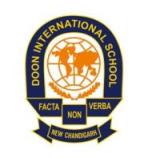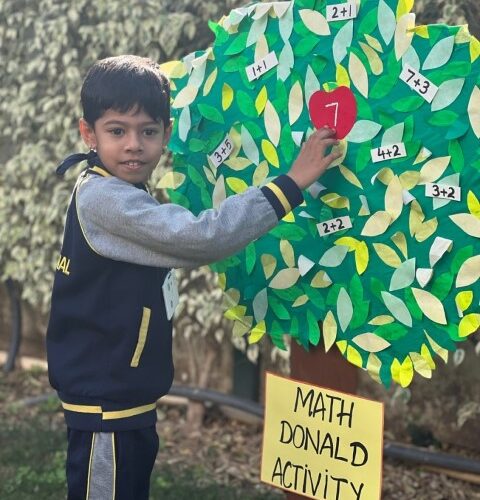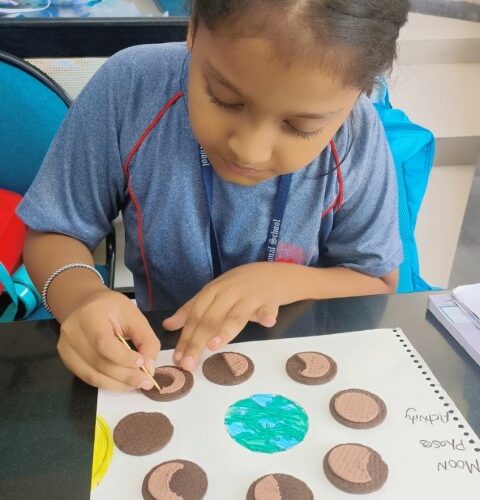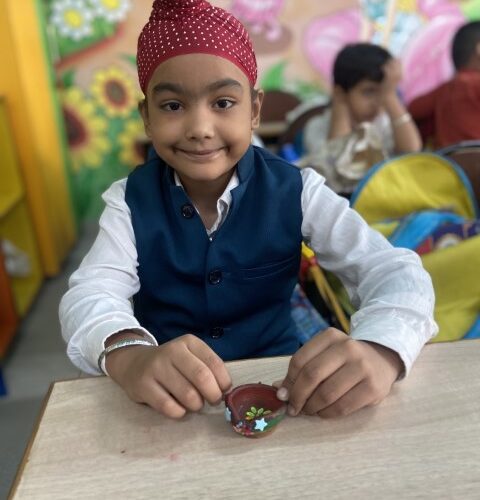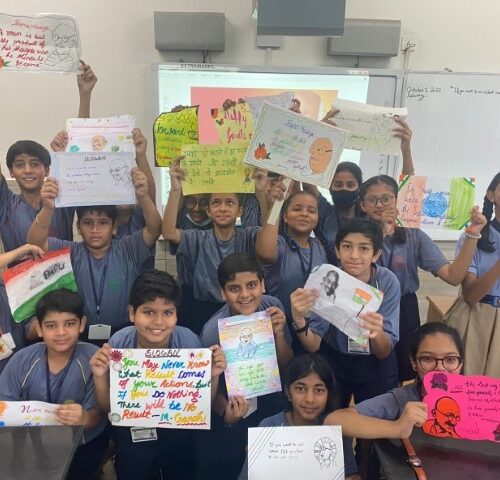The School offers a full day programme of activities, with a judicious mix of academic, sporting and co-curricular activities, in order to provide truly broad based and comprehensive all round education.
The education programme is student centered and all students are encouraged to develop their innate potential to the fullest. A rigorous curriculum has been devised to take care of the intellectual needs of its students, with a specific emphasis on preparation for further academic study in India or abroad. A humane attitude in the school promotes self esteem, supports and encourages constructive student interaction.The Formative Years (Play group, Nursery, KG)
The importance of Early Years Education cannot be underestimated and at Doon International, we have a truly outstanding Kindergarten Wing. Children from 2.5 years to 5 years old have a well designed infrastructure keeping their needs in mind. We are blessed with a fantastic environment for our youngest children to explore and a world-class curriculum focussed on their individual learning needs. We use the ‘Nature Nurture’ Curriculum as a base but adapt this to our international setting so as to ensure that learning takes place till the deepest levels. We have an excellent team of teachers who work closely with children to unveil their talents and promote development in a fun, engrossing and entertaining manner. Being an early childhood educator is a unique profession that is as much a life calling as a career. To enhance the physical growth and development of the children, we have a dedicated sports programme run by Leapstart International along with Jungle GYM aerobics & dance. The success has been experienced with students who begin their educational journey in our Kindergarten programme as it provides a strong and positive start and also helps to develop fine and gross sports skills. Our youngest lions are our pride and joy!The Junior School (Class I-V)
The junior school is the first step forward for our little ones as they enter Class I. The basic inputs that the child has been provided at the formative stage are consolidated at this level as the students become capable of understanding basic concepts of the various subjects. The infrastructure and the classrooms have been carefully selected to ensure that the sense of belongingness created in the early years carries on with the child as he moves to the junior school. Various co-curricular and extra curricular activities are introduced at this level and the children are encouraged to explore their creativity and individual talent.The Middle School (Class VI to VIII)
When a child enters Class VI, the school helps him make the transition from a protected environment to one where he develops his individuality and personality. The child is also encouraged to develop his interest in specific subjects as per his aptitude and potential so that in the later years he may specialize in his chosen areas. The child is now familiar with the school environment and is exposed to more formal ways of learning and testing. Co-curricular activities are given a lot of importance as they play a crucial role in the all round development of each child.The Senior School (Class IX to X)
The prescribed syllabus of CBSE forms the basis of the curriculum at this stage. Students are exposed to a wide spectrum of knowledge. Project work, audio visual aids, hands - on experience, excursions and exchanges help to enhance the students learning. The Senior students prepare for the first major examination of their lives, the CBSE Board Examination of Class X. At this level, the school strives to provide a scholarly yet stress free environment to the students so that they can achieve goals and standards they set for themselves. The teachers, at this stage, are recognized experts in their fields so that the students can be provided every opportunity to excel in academics. The senior school children also take the first step into adulthood and need adequate guidance and counselling from all concerned, hence the teacher is encouraged to be a friend, philosopher and guide for the children.Examination
Examination may not be the true test of a child’s ability, but regular classroom tests and periodic examinations at the school level are indicative of scholastic achievement. The results enable the class teacher as well as the students to reassess their orientation and take corrective steps to accord due attention to subjects and topics in which the child may not have been found upto expectations.Apart from Regular Class Tests, results of which are also intimated to the parents, examinations are organized as per the following schedule:
- Pre-Mid Term Examination: Mid May
- Mid-Term Examination: September
- Annual Examination: March
- Declaration of results: 31st March
Schedule of the Academic year
The school year is from April to March divided into two terms, as per the pattern prevalent in all public schools.
Session Commences: 1st week of April
1st Term
(For Grades-III-VIII) - April to September
(For Grades- IX-XI) - strictly as per the CBSE guidelines
Summer Vacation: End May to Early July (6 weeks)
2nd Term
(Grades-III-VIII) - October to March
(For Grades- IX-XI) - strictly as per the CBSE guidelines
Session Ends : 31st March
Learning Support
Doon International supports students and parents in every way to enhance the abilities of a student. We have learning support teachers to work with students who may find some aspects of the curriculum in their lessons challenging.
The role of learning support teachers includes:
- Assessment of student needs.
- Working with class teachers to provide help to students who need additional support.
- Creating a plan with targets to address specific needs of the students
It is important that school staff and parents work together collaboratively to ensure the best outcomes for students. There are regular meetings with parents to discuss the progress of students who are receiving help from learning support staff.
